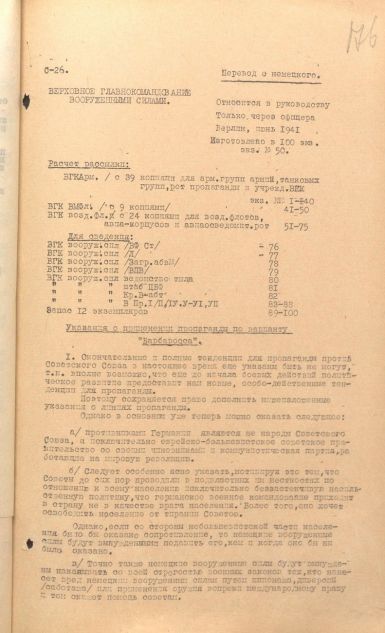Before the invasion of the USSR, the High Command of the German Armed Forces (Oberkommando der Wehrmacht, OKW) issued a directive for handling propaganda in the territories included in Operation Barbarossa. The general hoped to convince the Soviet population of his best intentions.
‘Directive for Handling Propaganda for Operation Barbarossa’
“I. (...) b) It should be made particularly clear, motivated by the fact that the Soviets have hitherto pursued an extremely shamelessly violent policy towards the entire population in the territories under their control, that the German High Command is not entering the country as an enemy of the population. Moreover, it wants to liberate the population from the tyranny of the Soviets.
However, if any resistance was offered by the non-Bolshevist part of the population, the German armed forces would be forced to suppress it, regardless of who was responsible or when it happened.
(...)
d) Propaganda aimed at splitting the Soviet Union into separate states should not yet be carried out. Propaganda in the various parts of the Soviet Union should use the most common language. This should not, however, lead to the nature of individual propaganda texts prematurely giving rise to the conclusion that there is an intention to dismember the Soviet Union.
Nevertheless, the expressions “Russia”, “Russians”, and “Russian armed forces” were to be avoided, and the terms “Soviet Union”, “people of the Soviet Union”, and “Red Army” used instead.
2. (...) All kinds of atrocities and violations of international law of which the Red Army might have been guilty should be highlighted”.
The Directive was issued by Alfred Jodl, Chief of the Operations Staff of the Oberkommando der Wehrmacht, of the German Armed Forces High Command. A hundred copies of the document were printed and sent to the army, navy, air force and propaganda companies.
A large part of the text of the Directive was devoted to the technology of propaganda dissemination. It was suggested that maximum use should be made of the “very extensive Soviet radio network”. For that purpose, the advanced units should, after capturing a town, immediately take control of the radio stations and “avoid any damage to the radio transmitting stations”. Furthermore, the General Staff ordered that a small number of Soviet newspapers be kept, which, under the direction of military censorship, would serve the purpose of German agitation. Simpler methods were also envisaged: posting proclamations on the walls of buildings, and scattering leaflets over enemy territory.
Every battle was to commence with an information salvo: “Armies and tank groups were authorised to use all propaganda means at their disposal before the commencement of hostilities.”
Source:
USSR Prosecution Document Book “Aggression against the USSR”, Document C-26
State Archive of the Russian Federation
F. R-7445. Series 1. Case 1666. Pg. 176-179
Translation from German
























